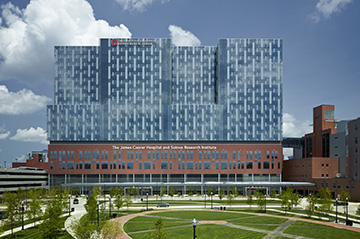May 29, 2019:
 The Ohio State University Comprehensive Cancer Center – Arthur G. James Cancer Hospital and Richard J. Solove Research Institute (OSUCCC – James) has joined the Big Ten Cancer Research Consortium (Big Ten CRC).
The Ohio State University Comprehensive Cancer Center – Arthur G. James Cancer Hospital and Richard J. Solove Research Institute (OSUCCC – James) has joined the Big Ten Cancer Research Consortium (Big Ten CRC).
Through membership in the consortium, cancer researchers from The Ohio State University may participate in the Big Ten CRC’s Clinical Trial Working Groups, submit letters of intent (LOIs) to the working groups for consideration as Big Ten studies, and collaborate with researchers from other Big Ten cancer centers on clinical trials.
Based in Columbus, Ohio, the OSUCCC – James is the only cancer program in the United States that features a National Cancer Institute (NCI)-designated comprehensive cancer center aligned with a nationally ranked academic medical center and a freestanding cancer hospital on the campus of one of the nation’s largest public universities.
The OSUCCC – James is one of only 50 NCI-designated comprehensive cancer centers in the nation, a designation maintained through competitive renewal since 1976. After its most recent NCI site review, the cancer center earned the NCI’s highest ranking, “exceptional,” and received a five-year, $23 million NCI support grant.
At Ohio State, more than 340 cancer researchers and their teams from 11 of the university’s 15 colleges work collaboratively, across multiple disciplines, to improve the effectiveness of cancer prevention, diagnosis and treatment.
The cancer program is home to one of the first comprehensive digital pathology programs in the United States. Digital pathology takes tissues mounted on glass slides, scans them and then digitally knits the individual pictures together to make one highly detailed image. The technology was approved by the Food and Drug Administration in April 2017 for use in primary cancer diagnosis.

Raphael Pollock, MD, PhD, director of The Ohio State University Comprehensive Cancer Center
The James Cancer Hospital and Solove Research Institute opened in 1990 as the Midwest’s first freestanding cancer hospital and the patient-care component of The Ohio State University Comprehensive Cancer Center. Ranked by U.S.News & World Report as one of the top hospitals in the nation for cancer care, the James Cancer Hospital and Solove Research Institute is one of only 11 DRG-exempt (diagnosis-related-group-exempt) or PPS-exempt (prospective-payment-system-exempt) institutions in the United States.
“We at the OSUCCC – James have always recognized the importance of collaboration for attaining optimal research-based clinical care,” said OSUCCC Director Raphael Pollock, MD, PhD. “Membership in the Big Ten Cancer Research Consortium will enhance our ability to collaborate with our colleagues at other academic institutions and more fully pursue our vision of creating a cancer-free world.”
“The Big Ten Cancer Research Consortium is delighted to welcome the OSUCCC – James as our newest member,” said Ruth O’Regan, MD, the Big Ten CRC’s chief scientific officer and Division Chief of hematology, medical oncology and palliative care in the Department of Medicine at the University of Wisconsin School of Medicine and Public Health. “We recognize the unique strengths and expertise of their cancer center, and we look forward to the contributions Ohio State researchers will bring to our Big Ten collaboration.”
Learn more about OSUCCC – James: https://cancer.osu.edu
About the Big Ten Cancer Research Consortium: The Big Ten Cancer Research Consortium was created in 2013 to transform the conduct of cancer research through collaborative, hypothesis-driven, highly translational oncology trials that leverage the scientific and clinical expertise of Big Ten universities. The goal of the Big Ten Cancer Research Consortium is to create a unique team-research culture to drive science rapidly from ideas to new approaches to cancer treatment. Within this innovative environment, today’s research leaders collaborate with and mentor the research leaders of tomorrow with the unified goal of improving the lives of all patients with cancer.
About the Big Ten Conference: The Big Ten Conference is an association of world-class universities whose member institutions share a common mission of research, graduate, professional and undergraduate teaching and public service. Founded in 1896, the Big Ten has sustained a comprehensive set of shared practices and policies that enforce the priority of academics in the lives of students competing in intercollegiate athletics and emphasize the values of integrity, fairness and competitiveness. The broad-based programs of the 14 Big Ten institutions will provide over $200 million in direct financial support to almost 9,500 students for more than 11,000 participation opportunities on 350 teams in 42 different sports. The Big Ten sponsors 28 official conference sports, 14 for men and 14 for women, including the addition of men’s ice hockey and men’s and women’s lacrosse since 2013. For more information, visit www.bigten.org.














Subscribe to the Big Ten CRC Newsletter X
X Facebook
Facebook YouTube
YouTube